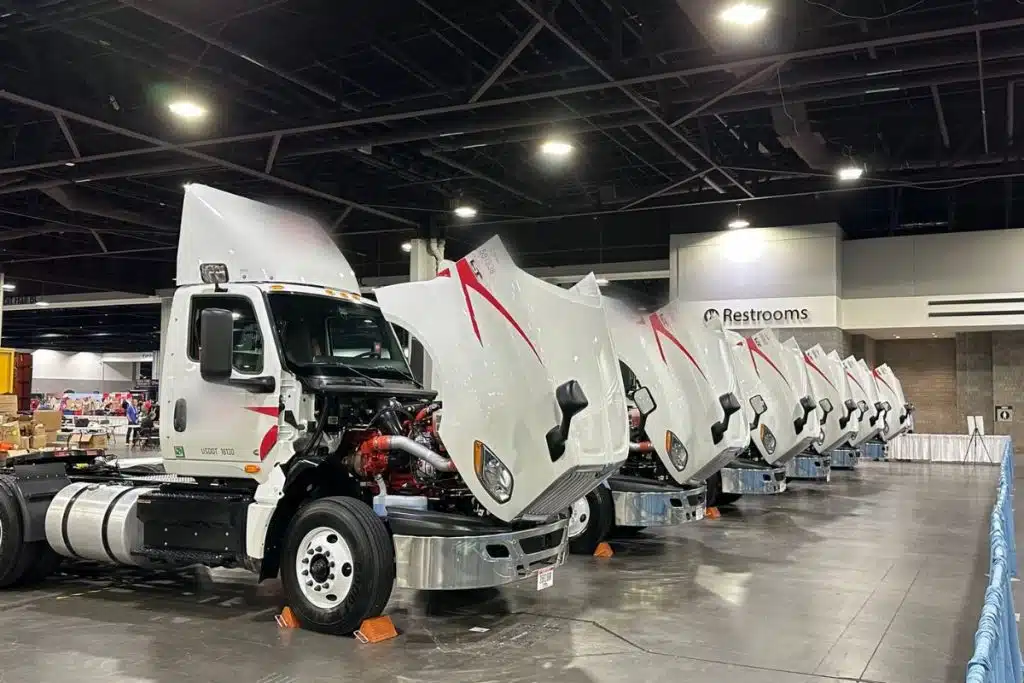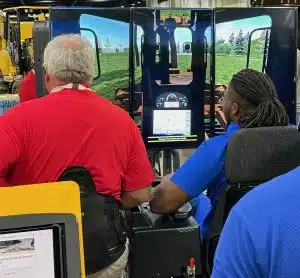Last week, our Director of Career & Technical Education (CTE), Chris, attended the SkillsUSA TECHSPO in Atlanta. TECHSPO is an opportunity for SkillsUSA National Leadership & Skills Conference attendees to engage directly with industry and educational partners while learning about new and exciting technology. Continue reading for Chris’s highlights and key takeaways from this year’s TECHSPO!
Highlights
It was wonderful to be among the more than 6,500 passionate Career and Technical Education students who, along with their parents, educators, coaches, and supporters, congregated at the massive Georgia World Congress Center near downtown Atlanta for the National Leadership and Skills Conference.
The excitement spilled out into nearby streets, hotels, and restaurants. Everywhere you looked, students and coaches alike were trading and collecting pins from each other’s home states in what is a traditional practice at SkillsUSA competitions.

Students and coaches who worked their way up from local competitions to become state champions were there to compete against each other in 108 different competency-based trade, technical, and leadership competitions. Test competencies are determined by the associated industry and the competitions are run with the assistance of both trade associations and labor organizations.As the Director of Career and Technical Education (CTE) content development for CSA Education, I was thrilled to attend the TECHSPO, a collection of around 250 exhibitors primarily focused on recruiting top Career and Technical Education talent to join workforce, military, and competence-based educational programs from across the 16 CTE career clusters.
Key Takeaways
Future Demand for Skilled Workers

The future demand for skilled workers will require expansion of all available pathways between high school and the workforce. I was a little surprised at first by the significant presence of competence-based, industry-driven certification providers, but I soon realized that it is an important adjacency to companies recruiting directly to their industries.
The expansion of pathways between high school and the workforce must encompass a broad range of options beyond the traditional college route. While higher education remains valuable and relevant, it is essential to acknowledge alternative avenues that can help prepare individuals with the necessary skills to enter the workforce and begin contributing meaningfully to their industry of choice directly out of high school.
Competence-based, industry-driven certification providers play a crucial role in this scenario. These organizations focus on delivering industry-specific training programs designed to develop practical skills and knowledge in line with the demands of the workforce in their fields. These certifications often serve as concrete evidence of an individual’s ability to perform specific job functions, providing employers with a reliable measure of competence.
Expand CTE Awareness
Events like the SkillsUSA Championships serve as powerful platforms to showcase the value of high school CTE programs. They bring together talented students who have developed a range of skills and passions through their CTE studies. Witnessing the passion and excitement in these students’ eyes sparks the question of why we cannot engage and inspire more of these types of students at a much younger age. This would foster early awareness of career options and encourage them to pursue their interests beginning in elementary school.
Traditional education often focuses heavily on academic subjects, leaving students with limited exposure to practical and vocational skills in the classroom. By introducing career options early on, children gain a more comprehensive understanding of the diverse pathways available to them. Earlier exposure can help them identify their interests, strengths, and goals, enabling more informed decision-making as they progress through their educational development.
Learners often develop perceptions about certain careers based on their limited exposure. By introducing younger students to a wide range of career options, we can challenge preconceived notions and ensure that students consider all possibilities when thinking about their future careers. Engaging students at the elementary level provides an opportunity to break stereotypes surrounding certain professions.

Starting career exploration at a younger age also allows for a more gradual and progressive development of skills, allowing them to build a solid foundation for their future career path. Hands-on, experiential learning opportunities allow students to build a solid foundation by applying theoretical knowledge in practical contexts.
Early career awareness can also help students align their academic pursuits with their future goals. By understanding the skills and knowledge required in various careers, students can make more informed decisions about their course selections, extracurricular activities, and higher education options. This alignment can lead to increased motivation, engagement, and a sense of purpose throughout their educational journey.
Conclusion
It was very exciting to see the future of skilled trades at this year’s SkillsUSA TECHSPO. We are excited for the future of CTE and how we at CSA can help educate future workers. For more information about any of our CTE services, feel free to contact us.
